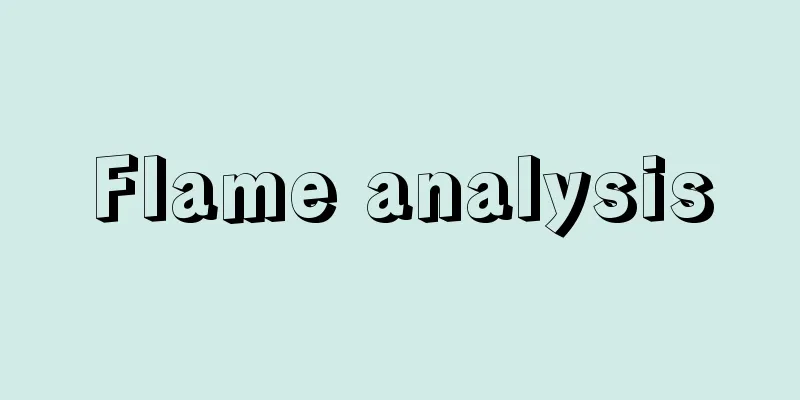Flame analysis

|
A general term for analytical methods that utilize the spectra of atoms, molecules, ions, etc. that are produced by a sample in a flame. It is broadly divided into three spectroscopic methods: emission, absorption, and fluorescence. In the narrow sense, it refers only to flame photometry (flame emission spectrometry), which utilizes emission. It is mainly used to quantify metal elements. [Takada Takeo] Flame photometryWhen a sample solution containing metal salts is atomized using a sprayer and burner and sent into a flame, the metal elements become molecular or atomic gases, mainly through thermal dissociation. Most of these molecules and atoms are in the ground state, which has the most stable electronic arrangement, and some are in an excited state. The excited molecules and atoms return to the ground state in a short time, emitting light of a wavelength corresponding to the energy difference. Flame emission spectrometry is a method for qualitatively and quantitatively determining the identity of a substance based on the wavelength and intensity of the spectrum produced at this time. [Takada Takeo] Flame atomic absorption spectrometryA method in which atoms in the ground state are irradiated with monochromatic light emitted from a hollow cathode lamp and quantified from the degree of absorption. [Takada Takeo] Flame atomic fluorescence spectrometryAtomized samples are irradiated with monochromatic light from hollow cathode lamps or electrodeless discharge lamps, or with continuous light with strong luminous intensity from sources such as xenon arcs, and when the excited elements return to a lower energy level, they emit an emission spectrum of the same or longer wavelengths. The light generated in this process is called atomic fluorescence, and this is an analytical method that utilizes this light for analysis. The flame used varies depending on the element being analyzed, from a low-temperature flame such as air-propane gas (about 1700°C) to a high-temperature flame such as nitrous oxide-acetylene flame (about 2800°C). Measurements using the above three methods have essentially the same basic configuration for the flame light section, spectrometry section, and photometry section, and are among the most widely used analytical methods, as they require simple equipment and enable highly sensitive analysis. [Takada Takeo] [Reference] | |Source: Shogakukan Encyclopedia Nipponica About Encyclopedia Nipponica Information | Legend |
|
試料が炎中で生成する原子、分子、イオンなどのスペクトルを利用する分析法の総称。発光、吸光、蛍光の三つの分光分析法に大別される。狭義には発光を利用した炎光光度法(フレーム発光分光分析)のみをさす。おもに金属元素の定量に用いられる。 [高田健夫] 炎光光度法金属塩を含む試料溶液を噴霧器とバーナーを用いて霧状にして炎中に送入すると、金属元素はおもに熱解離によって分子や原子状の気体になる。これらの分子や原子のほとんどは、もっとも安定な電子配列をもつ基底状態にあり、一部が励起状態になる。励起状態にある分子や原子は短時間に基底状態に戻り、このときそのエネルギー差に対応する波長の光を発する。フレーム発光分光分析は、このとき生ずるスペクトルの波長と強度から物質の定性と定量を行う方法である。 [高田健夫] フレーム原子吸光分析基底状態にある原子に、中空陰極ランプより発するその原子の単色光を当て、吸収の程度から定量を行う方法。 [高田健夫] フレーム原子蛍光分析中空陰極ランプや無電極放電ランプの単色光、またはキセノンアークのような発光強度の強い連続光を原子化した試料に照射し、これによって励起した元素が低エネルギー準位に戻るときに、同一あるいはそれよりも長波長の発光スペクトルを発する。この過程で発生した光を原子蛍光とよび、これを分析に利用する分析法である。 炎としては、空気‐プロパンガス(約1700℃)のような低温炎から、酸化二窒素‐アセチレン炎(約2800℃)のような高温炎まで、分析対象となる元素によって使い分ける。以上三つの方法による測定は、炎光部、分光部、測光部とも基本的な構成がほぼ同じであり、装置が簡単で、かつ高感度な分析が可能であることから、もっとも広く利用されている分析法の一つである。 [高田健夫] [参照項目] | |出典 小学館 日本大百科全書(ニッポニカ)日本大百科全書(ニッポニカ)について 情報 | 凡例 |
Recommend
Nishizawa Ippou
A kabuki writer and historical researcher in the ...
Okhlopkov, Nikolai Pavlovich
Born: May 15, 1900, Irkutsk [Died] January 8, 1967...
Agoyabon
…Books, also called books or books, are the oldes...
Tadarida
…A general term for a mammalian bat that belongs ...
Ernst Thälmann
Leader of the German Communist Party. He was orig...
Fabius - Quintus Fabius Maximus Verrucosus Cunctator
An ancient Roman military man. The Fabius clan wa...
Elaphe quadrivirgata (striped snake)
A non-venomous snake of the Colubridae family of t...
Kerala (State)
A state in the southwest of India. Also known as t...
Rinken (English spelling) visitation
When a ship or its crew or passengers are suspect...
Tacoma - Tacoma (English spelling)
Washington is a city on the Puget Sound in the we...
Kusuha Pass - Kusuha Pass
In the Middle Ages, this checkpoint was located on...
Iinoyama (Shimane) - Iinoyama
...Currently, squid fishing is the main activity,...
Area Rules
This law was discovered in 1952 by American R. Whi...
not straight
…a penalty kick is awarded to the not responsible...
Showing your name - Ujimise
...After returning home, a celebration is held. T...









